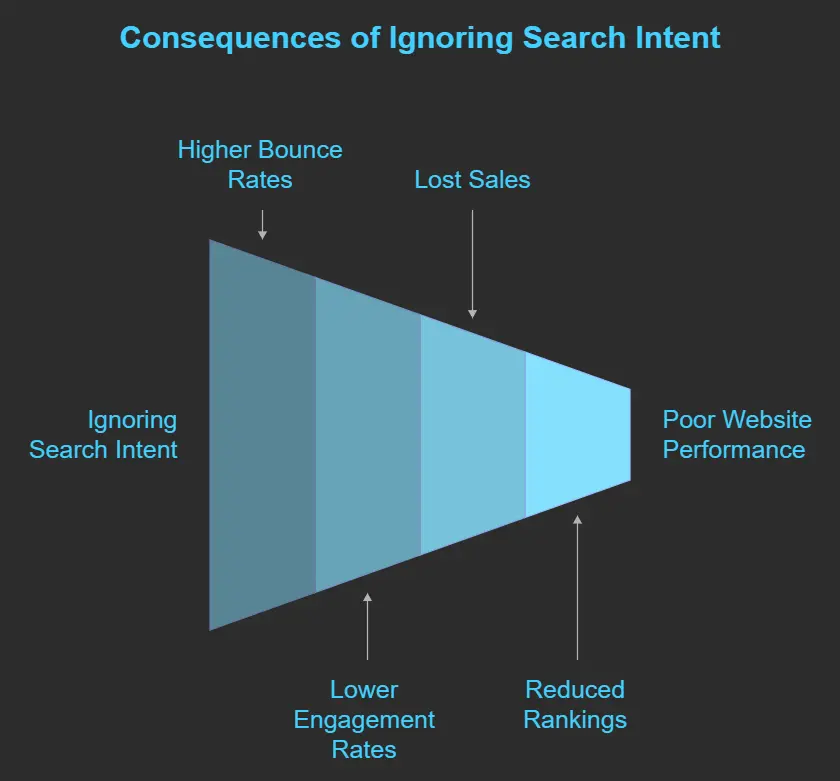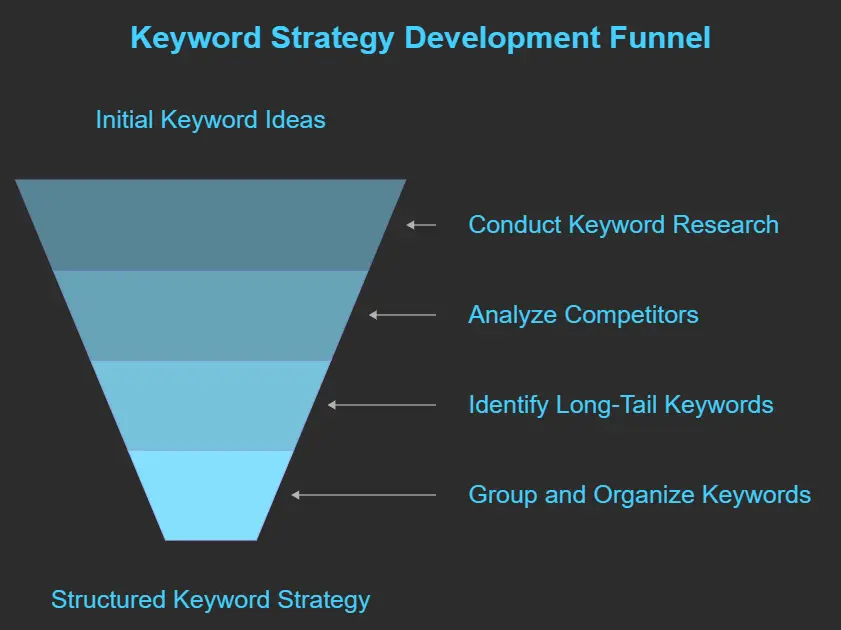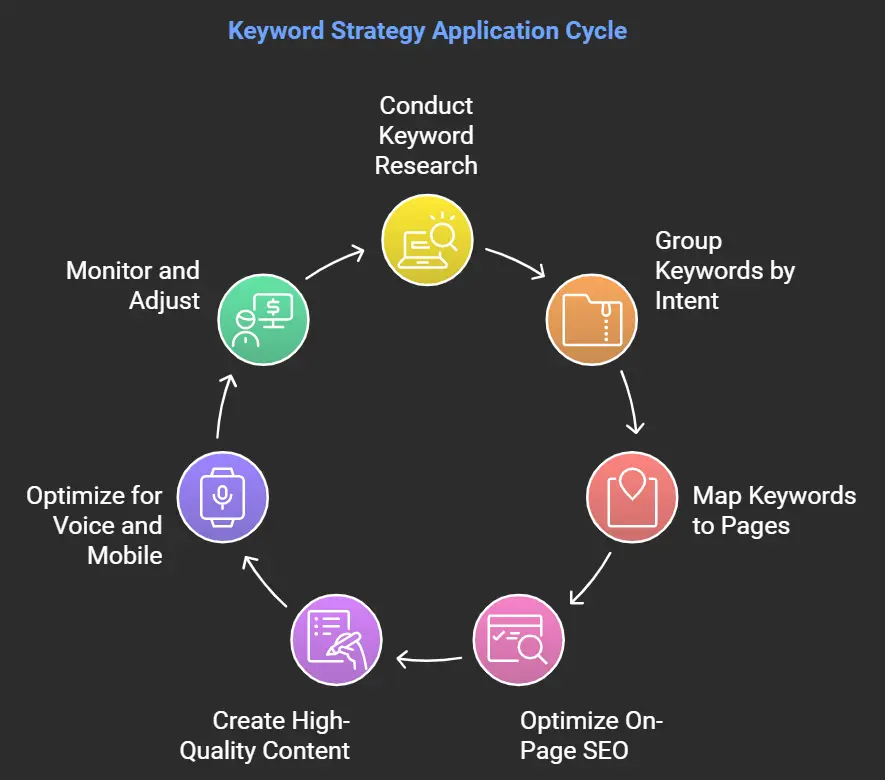Creating a Keyword Strategy for Your Website

Table of the content
Why a Good Keyword Strategy Matters
1. Consequences of Ignoring Search Intent
2. How to Build a Keyword Strategy Step-by-Step
3. Advanced Keyword Research Tips and Strategies
4. Tools for effective Keyword Research Strategies
5. Keyword Strategy Analysis
6. Common Mistakes in Keyword Strategy
7. How to Apply Your Keyword StrategyIntroduction
Why a Good Keyword Strategy Matters
By Day 13 of my 90-day course, I am basically nagging for you to develop a keyword strategy for your website. Don’t let the dust settle on several key skills in the fast-paced world of SEO; this one will set you apart from the crowd and make rankings and traffic storm ahead.
No concept that keywords bring traffic. They try the wrong or irrelevant keywords or not give the purpose of search to searchers.
Without an advance keyword research, your content will probably miss the target audience, making you invisible in SERPs. Worse, you may attract the wrong kind of visitors who won’t convert and waste your time and effort.
Here, in this blog post, I’ll take you through step by step on how to build a robust keyword strategy. We will cover everything-from keyword research all the way to advanced strategies that will help you truly dominate your niche.
So, let’s get started!
Day 13 of the Free SEO Course
Learn advanced strategies, then reach out to get online training to take your skills to the next level!
1. Consequences of Ignoring Search Intent
All this basically boils down to something called search intent. For instance, most people mistakenly aim at just targeting only the keywords and forget to sit and think about what intention the user would click on their website. Your efforts therefore will never convert.
Denial of search intent results in your website ranking for unsuitable searches, hence thereby negatively impacting your click-through rates and conversions.
What Is Search Intent?
The thing the person actually looks for while searching. Is the user trying to buy, find some information, or go directly to a specific website? Know this, therefore key to a strategy that gets out the right kind of content at the right time.
How Do I Optimize My Keyword Strategy For The Search Intent?
- Informative Keywords: The user is looking for information. Example: “How to prepare keyword strategy for SEO.”
- Navigational Keywords: The users are looking for specific website. Example: “Keyword Planner Google”
- Transactional Keywords: The user is ready to buy. Example “Buy keyword strategy tool.”
You have to match the intent of the content, thus the website is giving value to the user. Don’t underestimate the search intent-it is the key that unlocks traffic that converts.

2. How to Build a Keyword Strategy Step-by-Step
Let’s dive into the process of how to build a working keyword strategy. This is the process that will guide you through finding keywords and how one should use them correctly.
Step 1: Start with Keyword Research
Begin with a keyword research strategy. Without this, you are like someone who is attempting to navigate the world of SEO blindfolded.
How to do it:
- Tools: Start with Google Keyword Planner or SEMrush as a tool to research keywords within your niche.
- Competitors: You will know what keywords they rank for. Hence, you will be well-positioned to discuss gaps and opportunities.
- Long-Tail Keywords: There are specific, low-competition keywords, with fewer visitors but better conversion rates. Example: “How can I draft a keyword strategy for SEO?”
Group and Organize Keywords You must have selected your keywords; now it’s time to categorize those and group them according to user intent or category, depending on what content you are going to write and so on. This would help you keep track of everything and keep all content related to a particular intent.

Step 2: Prioritize Based on Competition and Relevance
Not all keywords are alike. Look for keywords that come with a good mix of both search volume and competition. High-competing keywords can be killers for a new site, so start from mid-level keywords and work out.
Step 3: Keyword Application to Content
Now that you have your keywords organized, it is time to find places within your content where you can incorporate them. Do not keyword stuff; rather find organic ways of using your keywords. Best case scenario is that they will flow organically to help your readers.
3. Advanced Keyword Research Tips and Strategies
You now have a great foundation, but really to take it to the next level, here are some advanced strategies for keyword research:
1. Leverage Google's "People Also Ask"
It is one of the features of Google SERPs. This feature lets you know about people who ask related questions. Use it to expand your keyword list.
2. Keyword Gap Analysis
Keyword gap analysis is the other essential means of knowing the difference between your website and competitors. Through tools such as Ahrefs, you get to know the position at which the competitors rank for keywords where you rank and hence can get insight about some content gaps you may fill in.
3. Keyword Bidding Strategy
For your PPC, you will need a keyword bidding strategy. This will mean that you’ll be bidding on the right words to maximize return on investment.
4. Keywords Updating
SEO isn’t static. What is hot today may be not tomorrow. Calibrate your keyword approach on continuous evolving search trends and changing user behavior.
4. Tools for effective Keyword Research Strategies

Being a local SEO pro, always make some must have tools to enhance your keyword research tactics. You will save time and get data-driven input with which you will refine your tactic in the long run.
- Google Keyword Planner: The Beginner’s Best Friend. It is free but is totally robust in search volumes.
- SEMrush. Through detailed analysis about keywords, competitors, as well as using backlink strategies
- Ahrefs: Good for the perfect keyword gap analysis as well as competitor research.
- Ubersuggest: Perfect for a beginner who starts off scratch on keyword research and strategy.
The tools help to pinpoint the best converting keywords and which data to build into a really effective SEO keyword strategy .
Let's Discuss Your Project
Get a free one-week consultation and share your vision for digital marketing with us.
5. Keyword Strategy Analysis
Having developed your keyword strategy, it is now time to monitor how your strategy performs. Follow along as we step by step on how to develop your keyword strategy and measure results.
- Monitor Keyword Rankings
- Use SEMrush or Ahrefs to monitor the rankings for your keywords over time.
- Monitor the fluctuations in rankings over time.
- Track Traffic and Engagement
Monitor Google Analytics to see if that keywording is actually bringing real traffic to your website. Is the visitor really sticking to your page, or do they just vanish into thin air? It could mean that the content is actually the adaptation to intent.
SEO is never that kind of set it and forget it method. Change your approach often as you become more aware. If your keyword is a dud, as it were, it’s time to think about either the content you’re creating or the keywords you are targeting.
6. Common Mistakes in Keyword Strategy
Now that we have addressed the most fundamental, let’s work our way through some of the most common mistakes I see clients make when they first begin building a keyword strategy for SEO:
- Keyword Stuffing: Having too many keywords in your content makes it unreadable and kills your SEO. Google penalizes this.
- Ignoring Long-Tail Keywords: While long-tail keywords may have fewer volumes, they often convert better because of its specificity.
- Forget to Update Your Strategy: SEO trends are cyclical and change over time. If you don’t, you’re behind.
7. How to Apply Your Keyword Strategy
The following are pretty useful tips on how to optimize keyword strategies in SEO:
- Use of Keywords in Headers: Make sure that, wherever possible, your focus keywords are applied in the H1 and H2 headers. This makes it much easier for the search engines to understand the structuring of the content.
- Internal Linking: Employ your keywords for your internal linking when you want to divert visitors to other parts of your website.
- Meta Description Optimization: Use your primary keyword in the meta description to increase the CTR from SERPs .
Conclusion
It starts with a keyword strategy: knowing who you are targeting, getting into deep keyword research, and ensuring the content is serving the intent of the search are all ways to put yourself on the path toward ranking high on Google.
Wish to know more about getting some bespoke help on how to craft an SEO keyword strategy? Just hit me up on WhatsApp +91 9780668174 or book a one on one appointment here. Also share this post to your friends in your social media networks!
Frequently Asked Questions (FAQs)
1. What is the best tool to use for keyword research?
Google Keyword Planner is ideal for newcomers but SEMrush provides more insights.
2. How often should I update my keyword plan?
Frequently, typically every 3-6 months, or whenever the variations in search behavior changes it.
3. What are long-tail keywords?
Long phrases that target the niche searches, usually with very low competition.
4. How do I avoid keyword stuffing?
Use the keywords organically in the content. Don’t spam it repeatedly. Remember, user experience comes first.
5. What's the difference between informational and transactional keywords?
Informational keywords are questions, and transactional keywords tend to target people who have actually decided to buy that thing.
6. How do I identify gaps in keywords?
Use tools like Ahrefs to find opportunities through keyword gap analysis.
7. How will I use search intent in my approach?
Use the type of content to match user intent: Informational, Navigational or Transactional
8. Can I use the same keyword on multiple posts?
Of course you can but you’ll want every post to have its own unique value and content so you are not cannibalizing keywords.
9. How does internal linking relate to keyword strategy?
Internal linking with keywords will give the search engines an understanding of your site structure.
10. How crucial is search volume while choosing your keywords?
Search volume matters, but you also cannot bank solely on that number. Don’t lose sight of competition or relevance for your desired audience.

About the Author
Deepak Sharma is the founder of Digital Deep Tech and a renowned SEO and digital marketing expert with over a decade of experience. Passionate about helping businesses enhance their online presence, Deepak specializes in creating SEO strategies that drive traffic and generate leads.




